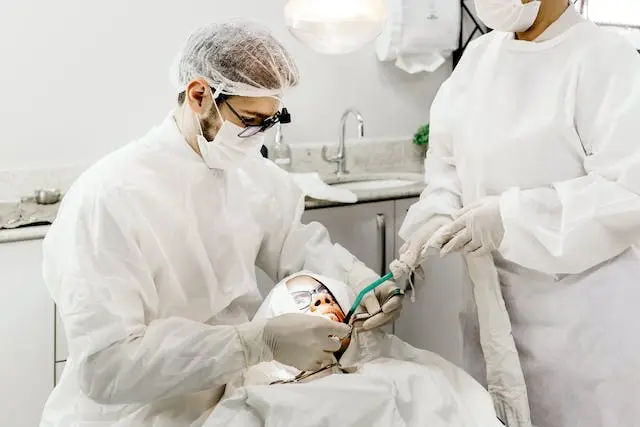The landscape of healthcare careers is constantly evolving, with new in-demand job opportunities emerging alongside shifting trends. From technological advancements to changes in demographics, the healthcare industry has numerous promising prospects for professionals. This article explores the current trends and opportunities in in-demand healthcare jobs, shedding light on the diverse career pathways and the factors fueling their growth.
Healthcare

Shift in Demographics and Healthcare Job Demand
The world of healthcare careers is buzzing with excitement as it adapts to the ever-changing needs of our population. An undeniable wave of an aging population is reshaping the demand for healthcare services and, consequently, for the professionals who provide them. This shift isn’t just a number’s game; it’s about gearing up to meet the unique healthcare requirements that come with a longer life expectancy. Think specialized care to support those golden years; that’s where the action is heating up, presenting a golden opportunity for those ready to step into a career that truly makes a difference.
Rising Aging Population’s Impact on Healthcare Workforce Needs
The number of older individuals is on the rise, and the impact on the healthcare workforce is significant. As we see more and more birthdays pass, the healthcare system is feeling the pressure to adapt. With an increase in our senior population comes a higher demand for medical professionals who specialize in age-related conditions. It’s not just about having more doctors and nurses; it’s about having the right kind of skilled workforce ready to handle the nuances of geriatric care.
This demographic shift pushes for a healthcare environment equipped with staff who are not only knowledgeable in treating the common colds but are also pros in managing chronic conditions that often come with age. Let’s be clear – experienced professionals in geriatrics and other age-associated healthcare services are becoming central to the job market scene in healthcare. We’re looking at a future where expertise in elder care is not just appreciated, it’s in hot demand.
Demand for Specialized Care for Age-Related Conditions
As people live longer, the need for healthcare that targets the unique challenges of aging is on the rise. Conditions like osteoporosis, arthritis, and dementia are becoming more common, prompting a surge in the need for specialists who can provide high-quality care tailored to the elderly.
Professionals who specialize in treating age-related conditions are vital in helping seniors maintain their health and quality of life. They’re not just doctors either; this field includes physical therapists, occupational therapists, and nurses who have the expertise to address the complexities associated with aging bodies and minds. This dedication to elderly care is creating a robust job market within the healthcare sector.
Innovation and Technology in Healthcare Careers
The world of healthcare is getting a high-tech makeover. Innovations like telehealth are changing how we meet with doctors, while health informatics brings big data into the game. This is creating a whole new field of careers that mix healthcare know-how with cutting-edge technology. These changes aren’t just cool—they’re also creating lots of new jobs for people who are ready to step into the future of medicine.
Telemedicine and Virtual Healthcare Services Revolutionizing Patient Care
Telemedicine and virtual healthcare have burst onto the scene, changing the game for patients and medical professionals alike. Instead of traveling to an office, patients can now chat with doctors and specialists from the comfort of home. Video calls, messaging apps, and monitoring devices connect patients with care providers instantly, making it super easy to get advice, prescriptions, and even certain diagnoses.
This shift isn’t just convenient; it’s a big deal for people in rural areas or those with limited mobility. And it’s not just for common colds or check-ups – virtual mental health services and chronic disease management are becoming more popular, too. Plus, healthcare professionals are loving the flexibility and the chance to help more folks in less time. With tech getting better every day, this trend is only going to grow – watch this space!
Career Prospects in Health Informatics and Data Analytics
The realm of healthcare is being deeply transformed by the digital data revolution. Health informatics and data analytics are becoming the backbone of modern healthcare systems, paving the way for heightened efficiency, better patient outcomes, and innovative treatment options. These fields are bustling with opportunities for those who are passionate about data and healthcare.
Professionals skilled in health informatics play a critical role in the management of patient information, making sure it’s not only secure but also accessible to the right healthcare professionals at the right time. On the other hand, experts in data analytics dive into the vast ocean of health data to find patterns, develop predictive models, and support decision-making processes that could quite literally save lives. With the expansion of electronic health records and the growing need for data-driven decision making, specialists who can navigate this intersection of data science and healthcare are in high demand.
Emerging Roles and Specializations
As the healthcare field races ahead, it’s clear that emerging roles and specializations are at the forefront of its transformation. This wave of change has introduced a set of unique and pivotal job titles, each playing a critical part in delivering high-quality healthcare. Now more than ever, professionals are needed who can blend traditional care with the nuances of today’s health challenges. Let’s dive into the roles that are shaping the future of healthcare and offering promising career paths for those ready to embrace innovation.
Growing Demand for Nurse Practitioners and Physician Assistants
The healthcare world is buzzing with excitement, especially for those looking to step into the shoes of a nurse practitioner (NP) or physician assistant (PA). These roles aren’t just jobs; they’re on the frontline of a medical revolution. The need for NPs and PAs is blowing up, thanks to their unique ability to provide high-quality care, often with a bit more flexibility and patient interaction than their MD counterparts.
Nurse practitioners and physician assistants are bridging an important gap. As we see more doctors specializing, these pros swoop in with their versatile skills, delivering primary care to a variety of patients. They’ve become the superheroes of rural clinics and busy urban hospitals alike, carrying with them the superpower to prescribe medications, diagnose illnesses, and even lead their own clinics in some places. The best part? They’re doing all this while keeping healthcare accessible and human. With the demand for healthcare rocketing sky-high, the call for NPs and PAs is loud and clear, promising a future with a stethoscope and scrubs that’s as fulfilling as it is fast-paced.
Specialized Roles in Mental Health and Geriatrics
As society pays more attention to mental health and the unique needs of the aging population, specialized careers in these fields are booming. For those with a passion for supporting mental wellness or aiding seniors, there’s great news: jobs in these sectors are not just in-demand, they’re also incredibly rewarding.
The growth in mental health services means more opportunities for therapists, counselors, and psychiatric nurses. They play a crucial role in providing care and designing treatment plans for a range of mental health issues. On the other hand, geriatric specialists, including geriatricians, geriatric nurses, and physical therapists, are now more important than ever. They work to improve the quality of life for older adults by managing complex age-related health concerns.
Critical Allied Healthcare Professions
The backbone of our healthcare system isn’t just the doctors and nurses we often think of; there’s a whole army of allied professionals working tirelessly behind the scenes. These roles are vital for diagnosing, treating, and preventing diseases, and as healthcare complexities grow, so does the need for skilled allied health workers. Whether it’s through analyzing medical tests or delivering targeted therapy, these professions are stepping into the spotlight, showing us their critical place in patient care.
Demand for Medical Laboratory Scientists and Diagnostic Sonographers
The healthcare sector is buzzing with excitement for lab wizards known as medical laboratory scientists. These professionals play a pivotal role by running lab tests that are critical for diagnosing and treating various diseases. The growth in this field is skyrocketing, primarily because our understanding of diseases is getting sharper and more sophisticated every day. Plus, as technology advances, these scientists get to work with cutting-edge equipment, making their jobs even more vital.
Diagnostic sonographers, on the other hand, are the specialists who use sound waves to peer inside the body, providing a glimpse that helps in identifying and monitoring various medical conditions. This role is seeing a hefty jump in demand, too—especially in obstetrics and gynecology. As patients increasingly seek non-invasive diagnostic methods, the hands holding the ultrasound probe become ever more in-demand. This field offers an excellent career opportunity for those who want to be on the forefront of medical imaging technology and patient care.
Expanding Opportunities for Respiratory Therapists and Radiation Therapists
The field of healthcare is buzzing with growth, and among the stars of the show are respiratory therapists and radiation therapists. With our world getting more health-conscious, these professionals are in the spotlight now more than ever. Respiratory therapists are the unsung heroes for patients with breathing troubles – think asthma, chronic obstructive pulmonary disease (COPD), and even COVID-19. These specialists are not just in demand in hospitals but also in sleep centers and patients’ homes.
On the flip side, radiation therapists stand at the forefront of the battle against cancer, operating sophisticated equipment to deliver life-saving treatments. As technology in cancer treatment advances, so does the need for skilled therapists who can navigate the intricacies of radiation therapy. The demand is soaring, and with it, the chance for these experts to shine in various settings, from large hospitals to dedicated cancer treatment centers.
Emerging Trends in Healthcare Administration
Did you know that the world of healthcare administration is booming with fresh trends and job roles that are just waiting for savvy individuals to step in? It’s a space where business smarts meet medical know-how, and it’s an absolutely pivotal part of keeping our health systems spinning. As we look at the tapestry of modern medicine, the bright threads of healthcare management and the detailed stitching of policy and economics are making the industry more vibrant than ever before. With new roles popping up and a keen focus on shaping the future of healthcare, this is one career area that’s not just about paperwork; it’s about paving the way for healthier communities.
Opportunities in Healthcare Management and Administration Roles
The world of healthcare management and administration is expanding quickly, thanks to the complex needs of modern healthcare systems. As hospitals and clinics become more focused on efficiency and patient satisfaction, they need savvy individuals to keep things running smoothly. These professionals are responsible for the planning, direction, and coordination of medical and health services, a challenge that requires both solid leadership and an understanding of the healthcare system.
Beyond just the running of entire hospitals, healthcare managers may also find themselves at the helm of specific departments or services. With a finger on the pulse of healthcare policy, economics, and regulatory environments, they play a pivotal role. The road to these roles might start with a degree in health administration, health management, or a related field, and often requires experience in either a clinical or administrative healthcare setting. This path can lead to a highly fulfilling career making real-world impacts on the health of communities.
Focus on Healthcare Economics and Policy Impacting Job Demands
The world of healthcare doesn’t just revolve around doctors and nurses; it’s also greatly influenced by the invisible hand of economics and the guiding principles of policy. As governments and organizations grapple with the costs of healthcare, experts in this field who understand the nuances of finance, regulations, and care models are increasingly sought after. These individuals play a pivotal role in ensuring services are both affordable for patients and sustainable for institutions.
Professionals with a knack for numbers and a passion for policy are finding their skills in more demand than ever before. Health economists, for instance, analyze trends and crunch data to shape healthcare strategy, while those in healthcare administration factor in costs and resources to make healthcare more efficient. Decisions these experts make based on economics and policy can lead to significant changes in the job market, predicting the need for certain roles or cutting back on others to balance the books.
Conclusion
The evolving landscape of healthcare careers presents a myriad of opportunities for aspiring professionals, fueled by demographic shifts, technological advancements, and emerging specializations. As the demand for quality healthcare services continues to rise, the job market in the healthcare industry is set to expand, offering diverse and rewarding career pathways for individuals passionate about making a difference in people’s lives.

